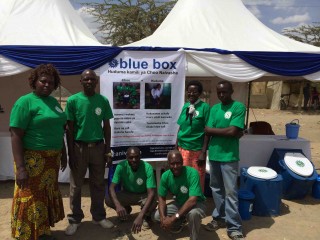Project Results:
Sanivation: fuel from human waste
Testing in-house sanitation models for tenants of land lords and labor camps
About
Sanivation, a social enterprise in Kenya, had developed a sanitation value chain concept. This is based on container based toilets (lease with a monthly fee), collection service of waste and treatment of this faecal matter into briquettes. As they realized the private market would not easily take up this innovation, they approached VIA Water. In this pilot, a marketing model was developed and tested to work through land lords and companies with labour camps. This service model could become a game changer if those parties and companies are convinced to adapt to the service for the millions of tenants at their premises.
Key results
-
Refined business plan for Sanivation plus a Theory of Change.
-
Municipalities and authorities have been convinced of integration the model into their sanitation strategies by the value of the briquettes, the poo-based end products.
-
Involvement in sanitation strategy of County Nakuru.
-
Start of a new waste water treatment/briquettes plant in Navaisha, meaning access for 6,250 people to sanitation.
Tips for the future
-
Networking and trust building are essential for working with institutions and municipalities.
-
Creating a base of local contacts that could support technical needs would be of great value to companies.
Potential for growth
This pilot was not innovative in itself, but in support of an innovation. It contributed greatly to the scaling strategies of the Sanivation model. Without this pilot, the original model based on household container services would have been impossible to scale. The briquette production became the core activity instead of the container based services. At this time, tea companies offer a good option for scaling (being large, e.g. 10,000 employees). The market potential is great, but competition is looming, especially because the playing field is not level.
Project partner
Sanivation
Period
2015 -2017
Last project updates
Background
Sanivation is a social enterprise dedicated to improving the overall health and environment of urbanizing
communities in East Africa through delivering clean, safe, and efficient sanitation services. Based in
Naivasha, Kenya, we have had success overcoming the market failure for sanitation by implementing a
privatized household sanitation model. Simply, we install toilets in people’s homes for free and home
dwellers pay monthly for waste collection. Waste is brought to Sanivation’s transformation site where
waste is rendered safe for reuse and transformed into charcoal briquettes, saving trees and preventing
environmental degradation. Sanivation has developed and manages the entire process. Overall this
privatized approach for the delivery of sanitation services has significant potential to increase sustainable
access to sanitation, reduce the need for groundwater, and improve the quality of water resources.
Project Plan
During an inception phase the contracts and conditions with a land lord and enterprise will be developed, as well as the best service model that could suit both the land lords and the tenants. Thereafter it will be implemented among possibly 200-300 households.
Target group
People who rent a house or apartment (tenants), or people that live in compounds, associated to an employer/company.
Sustainability
The project adheres to the so-called FIETS sustainability criteria.
Financial:
We are financially sustainable from our two recurring revenue streams, toilet subscriptions and affordable fuel.
Institutional:
We integrate our work with the Ministry of Health and Ministry of Energy. We also share our work within these ministries to help improve policies around sanitation.
Environmental:
We prevent feces and solid waste from being disposed openly in the environment and in local lakes and rivers. Our briquettes save 88 trees per ton produced.
Technical:
All of our technology is locally designed and manufactured. Secondly we train and hire people from the community to operate our processes.
Social:
Access to a safe and clean household toilet has been shown to restore dignity and reduce gender based violence. Tenants will also be involved in the design and testing of the service models. Emphasis will be on the female representatives of the households.
Overview of Goals
This project has 4 key goals:
1. Understand client needs (of landlords and labor camps) through customer development
2. Develop marketing and pricing plan
3. Pilot in home toilets among landlords and labour camps
4. Evaluate model and refine for scale
Results and indicators
- Service models tested among tenants of at least one land lord and one enterprise

